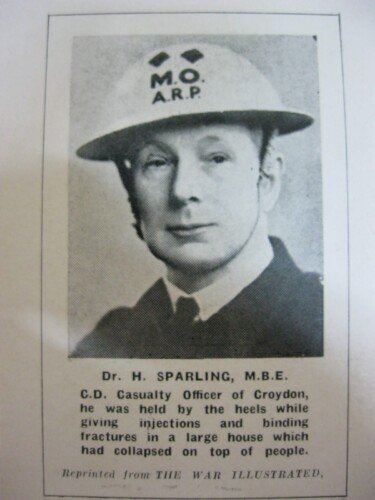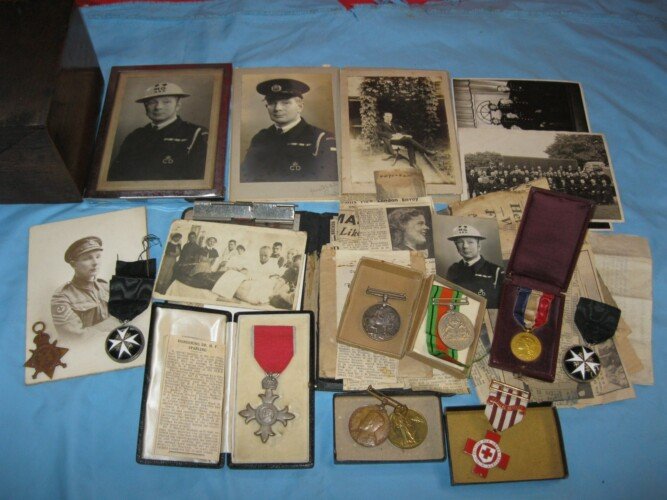‘In the hope his memory slips no further from sight’: Forgotten Blitz hero’s medals up for auction
Medals awarded to a Croydon doctor who won an MBE for his lifesaving work during the Blitz after being decorated in the trenches during WW1, are coming up for auction.
Dr Horatio Sparling lived in Dingwall Road, East Croydon, and was the local Divisional Surgeon for the St John’s Ambulance before volunteering as a medical officer with the Civil Defence organisation at the beginning of WW2 – despite being too old for active service in the military.
His medals from both the First and Second World Wars will go up for auction at South Dorsetshire Auctions in Wareham on February 25 – holding an auction estimate of £600 to £800.
The collection had been handed over by a relative of Dr Sparling’s former housekeeper, who had been left them by the doctor who died in 1965, at the age of 77.

Auctioneer, Mark Croucher, said Doctor Sparling was awarded the MBE after being dangled by his ankles into a house damaged by a German V1 rocket bomb so he could set fractures and give painkilling injections to those trapped within, despite the risk of the rest of the building collapsing and taking him with it.
Mr Croucher said: “Dr Sparling served throughout the first world war, initially with the Australian Voluntary Hospital and then with the Royal Army Medical Corps.
“He was awarded the Mons Star and clasp as an early volunteer for the war effort alongside the British War and Victory medals. He was also decorated by the French government.
“The newspaper clippings which come with the medals detail numerous acts of bravery by Dr Sparling as Croydon became the most-bombed Borough in England by rocket-powered German V1 Flying Bombs, known as ‘Doodlebugs’.”
Up until 1940, the First World War was known as the ‘Phoney War’ in the UK, having faced no major hostilities on the British front.

But in the late summer of 1940, the Blitz began.
In early August, raids on civilians killed 1,078 people across the country.
The first bombs to fall on Croydon and on London were in Addington, in June 1940. A series of explosions shook the South London neighbourhood with eight bomb craters reported in the fields. But on August 15, the full force of the war hit Croydon.
The attack began in the evening, when planes were seen flying in formation over South Croydon, within a half mile of the Croydon Aerodrome, several of the planes broke away.
Unannounced by the warning siren, it was not until they dropped their load and explosions erupted that their identity became clear.
The raid on Croydon was part of what a joint Air Ministry and Ministry of Home Security communique reported was a 1,000-bomber raid over a 500-mile front that day.

In Croydon, the aerodrome itself was badly damaged with a direct hit, training aircraft destroyed and craters perforating the airfield’s runways. Several factories and houses were hit, killing 62 civilians and injuring 185.
There followed almost continual air attacks which sawCroydon called to alert 399 times. In all, the raids amounted to more than a thousand hours when hostile aircraft were overhead or present.
This was the battlefield that Dr Sparling worked on. Tending to those trapped under rubble and injured by debris, earning himself an MBE for his bravery.
Mr Croucher said: “Sadly the bravery and resources of Dr Sparling – and the many others like him on the home front – are now largely forgotten.
“It would be nice to think that his medals could find a home with either a museum or an avid collector who would ensure his memory slips no further from sight.”
Pictured top: Dr Horatio Sparling (Picture: South Dorsetshire Auctions)
